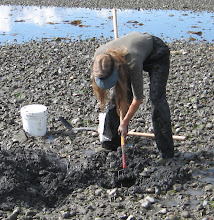SEATTLE (AP) — Randy Kinley, a Lummi tribal member, harvests salmon, clams and oysters in
northwest Washington, and eats what he catches about three or four times a week.
Washington waters are supposed to be clean enough to protect people who eat fish from rivers,
streams and lakes, but the state standard assumes people can safely eat less than 8 ounces of fish a month.
State environmental regulators think that amount is too low. Many Washington residents likely eat more than the current rate of 6.5 grams a day, they say, so they're recommending a fish consumption rate that would protect people who eat at least 24 times that amount.
How much fish Washington residents consume is important because it helps drives water quality standards and pollution control. Toxic pollutants such as mercury and polychlorinated biphenyls (PCBs) can accumulate in the flesh of fish and shellfish, so people who frequently eat it can take in harmful toxins.
A higher fish consumption rate means fewer toxic pollutants would be allowed in state waters — and likely tougher restrictions for polluters.
"Ensuring that the state's environmental standards accurately reflect our citizens' exposure is the next step needed to reduce toxics in our environment and protect public health for Washington's fish and shellfish consumers," Ecology's director Ted Sturdevant said last month.
Washington's current fish rate was developed in the mid-1980s and doesn't reflect that residents likely eat much more, officials said.
Oregon recently adopted one of the nation's toughest water quality standards, after determining that Oregonians eat about 175 grams of fish a day, or about 23 8-ounce fish or shellfish meals a month.
That rate, approved by the U.S. Environmental Protection Agency last month, is the highest for a U.S. state.
Washington officials suggest a fish consumption rate between 157 to 267 grams per day, based on the results of four previous surveys that looked at the fish diet of several tribes and Asian and Pacific Islanders. Ecology is seeking public comment through Dec. 30.
State officials say they want a fish consumption rate that protects all Washington residents who eat fish, including the general population and individuals who eat a lot of fish, such as Native Americans, Asian and Pacific Islanders, and some recreational fishers.
Many tribes already have much higher fish consumption rates and water quality standards that apply Wash. wants less risk for people who eat fish to tribal waters. The Spokane Tribe, for example, set its rate at 865 grams a day, one of the highest in the nation. The state's standard would apply to non-tribal state waters.
Several tribes say the current state rate doesn't reflect the important role fish and shellfish play in the diet and culture of tribal members.
"Our people used to say, 'When the tide's out, the table's set," said Kinley, a policy analyst for the
Lummi Nation, near Bellingham, Wash. "We want to be able to set our nets and catch fish to eat."
Charles O'Hara, planning director for the Swinomish Tribe near La Conner, Wash., said most tribal ceremonies, funerals or important occasion focus around salmon and other seafood.
"If you look at the current rate of 6 grams, it's pretty ridiculous," he said. "To be setting standards on such an unrealistic number ignores reality." The rate "should account for the people who eat the most," he added.
Tribes, including the Lummi and Swinomish, are doing their own surveys to find out how much fish tribal members eat. The results will help ensure the state's criteria protect the health of tribal members, they say.
Washington officials have closely watched Oregon's process.
"We want to use all the information they gained through their process," said Cheryl Niemi, a water quality specialist with Ecology. "We're not Oregon, so we'll have different stakeholders. Any new information we get here, that will be thrown in the mix."
The Northwest Pulp & Paper Association is waiting to see what happens in Washington state and how it will impact jobs, said Chris McCabe, the group's executive director. "Our main goal is to seek reasonable and cost-effective solution to this issue."
Wash. wants less risk for people who eat fish - seattlepi.com http://www.seattlepi.com/news/article/Wash-wants-less-risk-for-people-...
2
Subscribe to:
Post Comments (Atom)




2 comments:
Thank you, thats very interesting information. I need to share with my friends.
Thank you for sharing this very informative article. This information was such a joy to read for the health of the residents. Have a wonderful rest of your week.
Greg Prosmushkin
Post a Comment